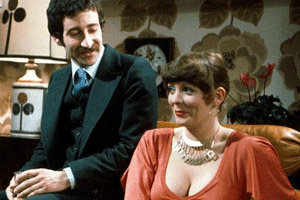
Abigail's Party
- TV comedy drama
- BBC One
- 1977
- 1 episode
Acerbic comic drama about a neighbours' get-together in suburbia. Written and directed by Mike Leigh. Also features Alison Steadman, Tim Stern, Janine Duvitski, John Salthouse and Harriet Reynolds
Press clippings
Archive: Nancy Banks-Smith reviews Abigail's Party, '77
Any party on TV is the signal for insult, indigestion and vomiting off.
Nancy Banks-Smith, The Guardian, 2nd November 2017Mike Leigh on Abigail's Party at 40
In 1977, over an epic Chinese meal, Mike Leigh was persuaded to return to theatre. It was supposed to be a quick, forgettable job but became a hot ticket and triumphed on TV. He looks back at a play born from frustration with suburbia.
Mike Leigh, The Guardian, 24th February 2017Abigail's Party is routinely found in the upper reaches of those "best ever TV drama" lists and quite right, too. Mike Leigh's suburban satire, little more than a filmed stage play when it was first broadcast as a Play for Today in 1977, is painfully brilliant. And it belongs entirely to Alison Steadman as Bev. Ah Bev, castrating monster and Demis Roussos devotee who, during the course of one memorable night, sails through a terrible drinks party like a Dreadnought with a hostess trolley. It is one of the great television performances. Bev is both grotesque and hilarious, with her nasal drone and towering lack of sensitivity ("Ange, can you take a little bit of criticism?"). Steadman earlier discusses Bev, and other characters from her remarkable career, with Mark Lawson. She's nice, modest and a complete professional.
Alison Graham, Radio Times, 7th November 2010With Abigail's Party, Leigh's unique talent was firmly hinted at, but not, I thought, fully confirmed. He obviously had a terrific eye and ear for human banality, but you wanted to be sure that the observations would shape up: art, after all, is more than just registration.
Clive James, The Observer, 21st March 1982Abigail's Party was horribly funny at times, stunningly acted and perfectly designed, but it sank under its own immense condescension. The force of the yelping derision became a single note of contempt, amplified into a relentless screech. As so often in the minefields of English class-consciousness, more was revealed of the snobbery of the observers rather than the observed.
Dennis Potter, The Sunday Times, 6th November 1977